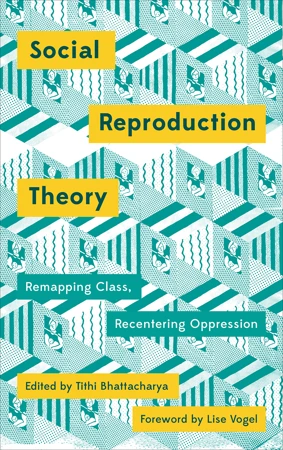Social Reproduction Theory – Remapping Class, Recentering Oppression

Blurb
« This groundbreaking collection explores the profound power of Social Reproduction Theory to deepen our understanding of everyday life under capitalism. While many Marxists tend to focus on the productive economy, this book focuses on issues such as child care, health care, education, family life and the roles of gender, race and sexuality, all of which are central to understanding the relationship between economic exploitation and social oppression. In this book, leading writers such as Lise Vogel, Nancy Fraser, David McNally and Susan Ferguson reveal the ways in which daily and generational reproductive labour, found in households, schools, hospitals and prisons, also sustains the drive for accumulation. Presenting a more sophisticated alternative to intersectionality, these essays provide ideas which have important strategic implications for anti-capitalists, anti-racists and feminists attempting to find a path through the seemingly ever more complex world we live in. »--Book summary
"What a pleasure it is to me to welcome this important and timely collection of essays. Social Reproduction Theory is probably the first book to draw on the past decade's resurgent interest in developing a coherent Marxist-feminist understanding of everyday life under capitalism." - Lise Vogel in her foreword for Social Reproduction Theory (2017).
Social Reproduction Theory is a book of collected essays by important scholars researching and philosophising around capitalism, its ramifications on life, on the capability to live a life, on the contradictions downsizing these capabilities and the consequences of all of that. The 10 essays span from introductory texts around the definition, means and ends of Social Reproduction Theory as an approach to analyse capitalism, including the discussion of not skipping relevant other forms of oppression to what Social Reproduction Theory can learn and incorporate from Intersectionality Theory and many more.
Comment from our editors:
This book, edited by Tithi Bhattacharya is, as Lise Vogel comments in her foreword, very timely. Published in 2017 it comes just in time to throw yet another lense on the inherently unstable system of capitalism relying on un(der)paid labour, mostly carried out by womxn, migrants, PoC, disabled people, ... and which problems the neglect and further exacerbation of distress in the capability to socially reproduce under modern day capitalism could pose for us as a society but also for the economic system itself. It is a great work spanning over a great variety of content, perspective and ramifications and serves as introductionary but also as advancing collection for understanding the interlinkage of economic dynamics and every day life.

